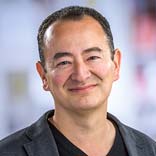The ColoCare Study Aims to Improve Patient Outcomes

ColoCare is a research study for people newly diagnosed with colon or rectal cancer. It includes researchers, doctors, nurses, and patients working together to learn more about improving health after a cancer diagnosis.
Our long-term goals for the study are to:
- Find out how to best treat this disease in the future by tailoring therapies to each patient's unique biology.
- Learn what future patients can do to improve their health.
More than 135,000 people are diagnosed with colorectal cancer each year. Together, we can find new ways to improve health after a diagnosis and identify new treatment options.
Our participants
Our study participants are aged 18-80, recently diagnosed with a colon or rectal cancer, and are patients of one of our study collaborating clinicians. You may be approached by one of our study staff in the future if you meet these eligibility criteria.
What are participants asked to do?

Complete questionnaires about your health habits and give updates about your medical history one to two times a year.

Give the ColoCare team permission to access medical records about your cancer diagnosis and treatment.

Give four total small blood samples in the first two years.

Allow us to collect and study some cancer tissue if surgery has been or will be performed.
The ColoCare Study may help researchers understand how health habits relate to characteristics in blood and tumors. This information may uncover the most successful prevention strategies and cancer treatments.
Important Notes
- Participating in the ColoCare Study will not change your medical care.
- The ColoCare team will coordinate blood and tissue sample collection directly with your doctors and nurses.
- Your participation is voluntary and confidential.
- You can stop participating any time.
Why be part of ColoCare?
Learning how to improve cancer treatment is a process that takes time. Today's cancer patients benefit from the medical knowledge gained through studies done before, just as future cancer patients will benefit from what we learn through research studies today.
ColoCare Study volunteers are vital to advancing our knowledge about improving health after a cancer diagnosis. Your involvement now can make a difference for future colorectal cancer patients.
Colorectal Cancer Facts
- In Washington, colorectal cancer is the fourth most commonly diagnosed cancer.
- Regular screening helps find colorectal cancer early, when it is most curable. Screening is especially important for relatives of people with the disease.
- The chances of curing colorectal cancer depend on the stage at diagnosis. Staging tells how far it has developed and if cells have spread in the body.
- On average, 2 out of 3 patients live longer than 5 years after diagnosis. Early-stage cancers which have not spread to lymph nodes can be cured in nearly 9 out of 10 people.
- Colorectal cancer research has had major successes—even for patients with late-stage disease. Participating in research studies builds our knowledge about new treatments.
- Research studies have also shown how patients can improve well-being and prognosis. Exercise is an important part.
Study Research Team

Chris Li, M.D., Ph.D.
Dr. Li is an epidemiologist whose research is focused on colorectal and breast cancers. He is currently working to discover novel blood based biomarkers that can be used to improve the early detection of colorectal cancer, and to identify various lifestyle and treatment related factors associated with risk of cancer recurrence among colorectal cancer survivors. In addition, he is researching the determinants of long-standing disparities in colorectal cancer incidence and mortality by race/ethnicity.

William Grady, M.D.
Dr. Grady identifies new ways to prevent, detect and treat colon cancer and other gastrointestinal, or GI, cancers. His research centers on molecular markers of disease, called biomarkers, that are easily accessible in blood or stool samples. A molecular biologist, Dr. Grady identifies biomarkers that eventually could be used in widely available tests to detect cancer early, when it is most treatable, or even identify healthy tissues at high risk of becoming cancerous.